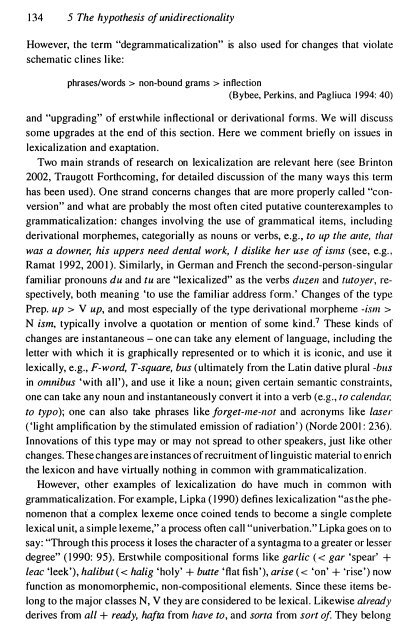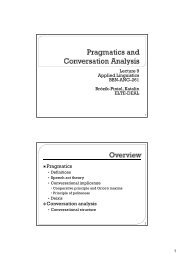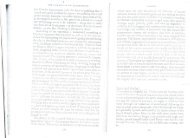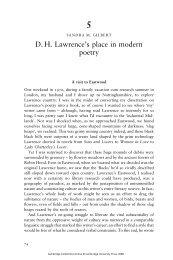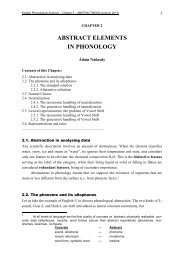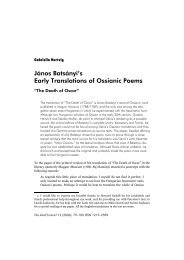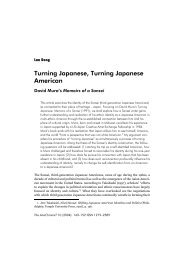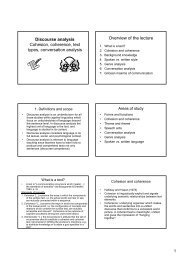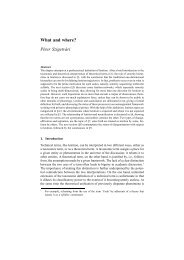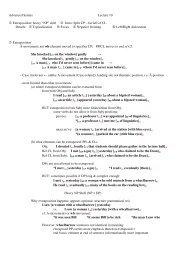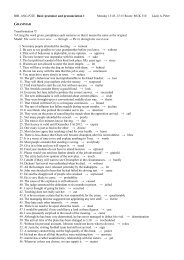Gram - SEAS
Gram - SEAS
Gram - SEAS
You also want an ePaper? Increase the reach of your titles
YUMPU automatically turns print PDFs into web optimized ePapers that Google loves.
134 5 The hypothesis of unidirectionality<br />
However, the term "degrammaticalization" is also used for changes that violate<br />
schematic clines like:<br />
phrases/words > non-bound grams > inflection<br />
(Bybee, Perkins, and Pagliuca 1994: 40)<br />
and "upgrading" of erstwhile inflectional or derivational forms, We will discuss<br />
some upgrades at the end of this section, Here we comment briefly on issues in<br />
lexicalization and exaptation,<br />
Two main strands of research on lexicalization are relevant here (see Brinton<br />
2002, Traugott Forthcoming, for detailed discussion of the many ways this term<br />
has been used), One strand concerns changes that are more properly called "conversion"<br />
and what are probably the most often cited putative counterexamples to<br />
grammaticalization: changes involving the use of grammatical items, including<br />
derivational morphemes, categorially as nouns or verbs, e,g" to up the ante, that<br />
was a downer; his uppers need dental work, I dislike her use of isms (see, e,g"<br />
Ramat 1992, 200 I), Similarly, in German and French the second-person-singular<br />
familiar pronouns du and tu are "Iexicalized" as the verbs duzell and tutoyer, respectively,<br />
both meaning 'to use the familiar address form.' Changes of the type<br />
Prep. up > V up, and most especially of the type derivational morpheme -ism ><br />
N ism, typically involve a quotation or mention of some kind. 7 These kinds of<br />
changes are instantaneous - one can take any element of language, including the<br />
letter with which it is graphically represented or to which it is iconic, and use it<br />
lexically, e.g., F-word, T-square, bus (ultimately from the Latin dative plural -bus<br />
in omnibus 'with al\'), and use it like a noun; given certain semantic constraints,<br />
one can take any noun and instantaneously convert it into a verb (e.g., to calendQ/;<br />
to typo); one can also take phrases like fo rget-me-not and acronyms like laser<br />
('light amplification by the stimulated emission of radiation') (Norde 200 I: 236).<br />
Innovations of this type may or may not spread to other speakers, just like other<br />
changes. These changes are instances of recruitment oflinguistic material to enrich<br />
the lexicon and have virtually nothing in common with grammaticalization.<br />
However, other examples of lexicalization do have much in common with<br />
grammaticalization. For example, Lipka (1990) defines lexicalization "as the phenomenon<br />
that a complex lexeme once coined tends to become a single complete<br />
lexical unit, a simple lexeme," a process often call "univerbation." Lipka goes on to<br />
say: "Through this process it loses the character of a syntagma to a greater or lesser<br />
degree" (1990: 95). Erstwhile compositional forms like garlic « gar 'spear' +<br />
leac 'leek'), halibut ( < halig 'holy' + butte 'flat fish'), arise « 'on' + 'rise') now<br />
function as monomorphemic, non-compositional elements. Since these items belong<br />
to the major classes N, V they are considered to be lexical. Likewise already<br />
derives from all + ready, hafta from have to, and sorIa from sort of They belong


